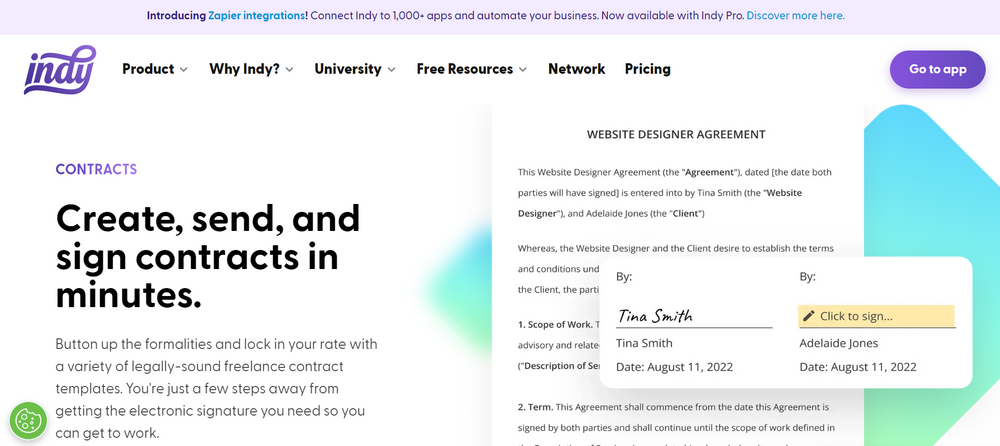As a freelancer or small business owner, you always do your best to ensure that your work meets the highest possible standards. You want to keep your clients and collaborators happy, meet your deadlines, and receive due payment on time in exchange. Unfortunately, that's not always the case.
Disputes will crop up from time to time. And sometimes, a client will be unhappy enough with a situation to threaten legal action. As a small business, you may not have the resources to settle matters through the formal court system, and you certainly don't have the time either. Your best recourse is arbitration, an out-of-court process that you can use to settle a dispute using a neutral third party. Here’s everything you need to know about an ‘arbitration clause’ so you can be prepared for any disputes when they arise.
What is an arbitration clause?
Arbitration clauses are general provisions found in contracts stating when arbitration is required as a form of alternative dispute resolution. Arbitration agreements address the party's rights should any major legal disputes crop up over the contract. Most arbitration clauses state that both parties agree not to sue one another but will instead arbitrate disputes and settle their differences out of court.
There are many different types of arbitration agreements. Employee arbitration agreements are usually designed to avoid wrongful termination lawsuits, for example, but a freelancer may include a clause to dispute non-payments or non-delivery of work.
When a dispute arises, the parties will work with qualified arbitrators to reach a mutual agreement about the solution to the problem. This could include a settlement payment or other remedy similar to what a court may issue. During the mediation, the two parties can discuss remedies on their own terms.

Arbitration agreements can be binding or non-binding. A binding arbitration clause means that the decision made by the arbitrator is final and that the courts will enforce that decision. If the arbitration clause is non-binding, either party can reject the decision and choose to resolve the matter through litigation. Binding arbitration is generally preferred because it's more decisive.
What to include in arbitration agreements?
You can find a variety of sample arbitration clauses online, but most arbitration clauses use language like, "The parties to this contract agree to resolve legal disputes through arbitration methods rather than civil lawsuits."
Your arbitration clause should be as specific as possible, containing information including:
- which parties are affected by the clause
- when the clause goes into effect
- whether or not the clause can be terminated or modified
- the consequences of violating the clause
Your arbitration clause may protect you against a lawsuit. For example, if a client decides to violate the agreement by filing a lawsuit, you can present the arbitration clause to the judge. If it's valid, the judge will likely order both parties to pursue arbitration. In many cases, both parties agree that their contractual rights and benefits will be terminated if they violate the arbitration clause by pursuing litigation.
What are the advantages of an arbitration clause?
There are pros and cons to adding an arbitration clause to your contract. Arbitrations are faster and more efficient than going to court because they are less involved and avoid courtroom proceedings altogether. They are extremely flexible, which means both parties can settle the dispute in their own time (instead of waiting for a court date), and parties can choose their own arbitrators.
Choosing your own arbitrator has its own benefits because you can choose someone who understands the nuances of your industry to make the final decision. In the case of binding arbitration, the final determination is binding, and both parties must adhere to the arbitrator's decision.

When does this clause become important?
There are many benefits to choosing a career as a freelancer. But while you have a lot more freedom, you also take on all of the responsibilities that come with running a business, as well as the legal risks. If something goes wrong, you could face a financially devastating legal battle.
One of the most frequent battles that freelancers face involves payments. Clients may refuse to pay you, either claiming they are unable to or because they believe you didn't deliver your end of the bargain. Similarly, you may charge penalties or interest for late payments that a client might dispute. A court ruling may help you in the long run, but as a small business or freelancer, every payment counts. Having an arbitration clause in your contract can resolve the matter quickly and without a lawyer.
You may also face disputes due to an honest mistake you've made. As a freelancer, you use your technical knowledge and experience to offer clients advice. If you make a mistake and give advice or deliver work that doesn't have a good outcome, you may inadvertently cause a financial loss for your client.
Clients may be willing to overlook this error, or they may pursue the matter in the courts. Either way, a court case can be costly and time-consuming. Arbitration clauses can protect you against financial losses and damages if you are at fault.
Clients may also misconstrue or misunderstand delivery outcomes or completion dates. Whenever there is ambiguity, there's a possibility of a misunderstanding and disputes arising accordingly.
How does arbitration work?
The claimant will start arbitration by sending a request for arbitration in writing with a description of the issue that's in dispute. If the arbitration agreement states that each party nominates an arbitrator, the request should include the identity of the claimant's arbitrator. The other party will have an opportunity to respond within a specific timeframe.
There will be a formal tribunal, with the two arbitrators selected and a third arbitrator as the chair. Each party will likely provide a written submission, including reports by technical experts or witness statements. Both parties will put forward arguments and questions, and the tribunal will produce the award, rights, and obligations.
Creating a contract with an arbitration clause
Freelancers need contracts to protect themselves against legal disputes and financial loss. Fortunately, you don't need to hire expensive attorneys to draw up your contract. Indy has a series of legally-vetted and customizable contract templates you can use to draw up legally binding professional contracts.

Use the templates as the jumping-off point, and add the clauses and amendments you feel are necessary, including an arbitration clause. A contract can go a long way to avoiding disputes altogether by clearly setting out the expectations and scope of work for every project.
Make sure to include clear payment terms, copyright and IP protection for your work, the contract length, the window agreement and the notice period for termination. You can add your arbitration clause and details about dispute resolution under general clauses in the contract.
Conclusion
It doesn't matter how careful you are or how hard you work. Mistakes and disagreements will crop up during your career, and the consequences can be devastating if you haven't taken the necessary steps to protect yourself. An arbitration clause addresses the party's rights in the event that a major dispute crops up over the contract.
Start by drawing up a contract. You can do this yourself using any of the contract templates from Indy, which include an arbitration clause to help you avoid expensive lawsuits down the line. This small step is all it takes to protect yourself and your business financially.



